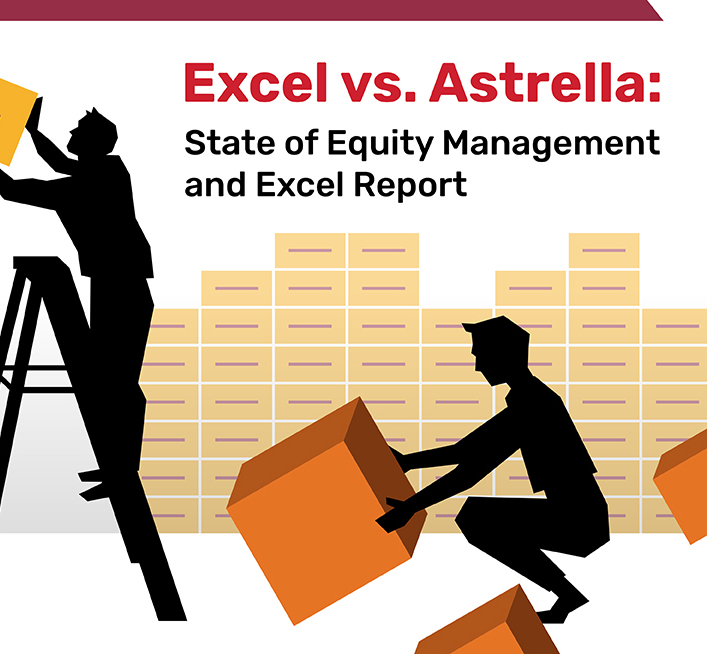Equity management and investing are complicated topics, and many of our clients run into terminology that’s new to them and their operations. This is our ever-growing glossary of terms related to cap table and equity management, touching on key Astrella offerings and services.
- Cap Table: A cap table, short for “capitalization table,” is a comprehensive record or spreadsheet that outlines the ownership structure of a company. It includes details about various classes of shares, shareholders, their respective ownership percentages, and any equity-related information. Cap tables are essential for tracking and managing equity distribution and are often used during funding rounds and exit events.
- 409A Valuation: A 409A valuation is a formal assessment of the fair market value of a company’s common stock. It is conducted to ensure that stock options and other forms of equity compensation are granted at an appropriate price, complying with IRS regulations under Section 409A. This valuation is crucial to avoid tax penalties for employees and founders who receive stock options.
- 83(b) Election: An 83(b) election is a decision made by an employee who has been granted restricted stock to include the value of that stock in their taxable income at the time of grant rather than when it vests. By making this election, the employee can potentially reduce their tax liability if the stock appreciates in value between grant and vesting.
- Angel Investor: An angel investor is an affluent individual who provides financial support to startups and early-stage companies in exchange for equity ownership. Angel investors often play a crucial role in the early funding stages of a company and may offer mentorship and industry expertise in addition to capital.
- ASC 718: Accounting Standards Codification 718 (ASC 718) is a set of accounting rules and guidelines governing stock-based compensation’s accounting treatment, including stock options and restricted stock units (RSUs). Companies must adhere to ASC 718 when reporting the expense associated with these equity awards on their financial statements.
- Burn Rate: A financial metric measures how quickly a company is spending its available capital or cash reserves. It is typically calculated monthly or annually and helps assess a company’s sustainability by estimating how long it can operate before requiring additional funding.
- Cap Table: A cap table, or capitalization table, is a foundational document for any company, detailing the ownership structure by listing all shareholders, the types and amounts of shares they own, and their respective ownership percentages. Cap tables are essential for transparency, decision-making, and tracking equity changes during fundraising rounds or other equity-related transactions.
- Common Stock: Common stock represents basic ownership in a company and typically includes voting rights in shareholder meetings. Holders of common stock are entitled to a share of the company’s profits through dividends and have a claim on its assets if the company is liquidated, though they are generally subordinate to preferred stockholders in such scenarios.
- Distribution Waterfalls: Distribution waterfalls are mechanisms used to determine the order and priority of distributing proceeds from a company’s exit event, such as a sale or IPO. They specify how the funds are distributed among various stakeholders, including preferred and common shareholders, debt holders, and employees with equity interests, ensuring a fair and equitable distribution.
- Equity Management: Equity management is the process of administering, tracking, and optimizing the allocation of equity ownership within a company. This includes the issuance of stock options, restricted stock units (RSUs), and other equity-based incentives to employees, founders, and investors. Effective equity management helps maintain equity transparency, aligns interests, and retains talent.
- Equity Management: Equity management is the systematic process of overseeing and administering the distribution and allocation of equity within a company. This involves managing stock options, restricted stock units (RSUs), and other forms of equity compensation and ensuring compliance with legal and regulatory requirements. Effective equity management helps align incentives, retain talent, and maintain transparency in ownership.
- ESSP (Employee Stock Purchase Plan): An Employee Stock Purchase Plan (ESSP) is a company-sponsored program that enables employees to purchase shares of the company’s stock at a discounted price. Employees typically contribute to the plan through regular payroll deductions, allowing them to acquire company stock as a form of long-term savings or investment.
- Funding Rounds: Funding rounds are distinct stages of capital raising for startups and companies to secure investment. These rounds, often labeled Series A, Series B, Series C, etc., represent different growth and financing needs phases. Each round involves negotiations with investors to exchange equity or ownership stakes for capital.
- Series A Funding: Series A funding is typically the first significant round of investment in a startup. It occurs after the seed stage and is focused on scaling the business, expanding market reach, and solidifying the company’s market position. Series A funding often involves venture capital firms and institutional investors.
- Series B Funding: Series B funding is the subsequent round of financing following Series A. Companies in this stage are usually in a growth phase and seek additional capital to expand their operations further, develop new products or services, and capture a larger market share.
- Series C Funding: Series C funding is a subsequent round of financing that occurs after Series B. Companies at this stage often pursue more substantial capital to support aggressive scaling efforts, explore acquisition opportunities, or prepare for an initial public offering (IPO).
- Stock (or Share): A stock or share represents a company’s ownership unit. Holders of stock are referred to as shareholders and typically have rights to vote on certain company decisions, receive dividends when declared, and participate in the company’s profits. Stocks can be classified into different types, such as common stock and preferred stock, each with its own set of rights and privileges.
- Stock Options: Stock options are contractual rights granted by a company to employees, allowing them to purchase a specified number of company shares at a predetermined price (the exercise price) within a defined period. Stock options are a common form of equity-based compensation used to incentivize and retain employees.
- Preferred Stock: Preferred stock is a class of stock that holds certain privileges and preferences over common stock. Preferred shareholders typically have priority when it comes to receiving dividends and proceeds from a company’s sale or liquidation. Preferred stock often lacks voting rights, which are more commonly associated with common stock.
- RSUs (Restricted Stock Units): Restricted Stock Units (RSUs) are a form of equity compensation awarded to employees. RSUs represent a promise to receive a specified number of company shares upon vesting without requiring an upfront purchase. They are subject to vesting schedules and may have certain restrictions or conditions.
- Rule 701: Rule 701 is a regulatory provision that permits private companies to issue stock or stock options to employees and other service providers without registering these securities with the U.S. Securities and Exchange Commission (SEC). It sets specific conditions and limitations on issuing these securities, such as annual sales limits and disclosure requirements.
- Unicorn: A unicorn is a privately held startup or company that achieves a valuation of over $1 billion. This term often describes companies with extraordinary growth potential and disruptive innovations. Investors highly seek unicorns due to their perceived potential for substantial returns.

Tom Kirby
Tom Kirby serves as the Head of Global Sales at Astrella. With more than 20 years of experience in sales and business development, he is dedicated to fostering strong client relationships and assisting both private and public companies in understanding and effectively communicating their value.
































































































































